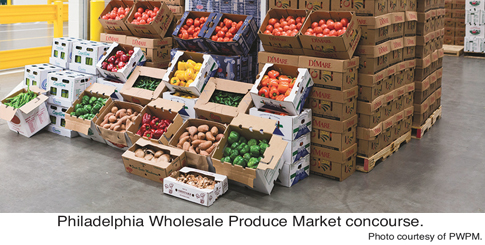Expansion
Growth at the PWPM, by all accounts, has been phenomenal. The oldest tenant on the Philly market, M. Levin & Company, Inc., has been going strong for 111 years and is still family owned and operated. The wholesaler recently purchased two more units and put in a new ripening facility to allow for another 400 pounds of mangos, avocados, and bananas.
In terms of sales, technology, and overall growth, the company is “steadily going uphill” according to Levin. “As far as the cold chain goes,” he adds, “we couldn’t ask for anything better.”
Preferred Fruits & Vegetables
Like many states, the Pennsylvania Department of Agriculture supports a locally grown marketing program. Launched in 2003 and signed into law in 2011, the ‘PA Preferred’ initiative helps buyers and consumers identify food and agricultural items grown or processed within the state of Pennsylvania by adorning them with a bright blue and yellow logo.Over 1,500 producers are currently licensed in the state to use the PA Preferred logo. From individual commodities to packaging and signage, the PA Preferred logo can be found at hundreds of farmers’ markets and roadside stands, as well as grocery stores, restaurants, and many types of foodservice businesses throughout the state’s 67 counties.
Produce grown in the Keystone State ranges from blueberries, cherries, grapes, peaches, pears, and raspberries to beets, cauliflower, eggplant, mushrooms, peppers, and tomatoes.
Mushrooms continue to be the state’s top produce-related crop in terms of value and volume, and is one of three crops available year-round (the other two are apples and lettuce).
Commodities with the shortest window of local availability include grapes (only September); blackberries (August); strawberries (June); tart cherries (July); sweet cherries (June-July); peas (May-June); and blueberries, nectarines, plums, and sweet potatoes (August-September).
Kovacevich agrees; his namesake company has also expanded significantly, doubling its workforce and increasing space from four to nine units with a capacity of over 100 truckloads. And although the company’s team of 12 buyers can sell anything, each “focuses on a relatively small set of items, so they can be most adept at answering the particular needs of each customer,” he says.
With the retirement of the receiver’s “watermelon legend,” Marty Strulson, third generation produce protégé Ry Manos stepped up to the “challenge and responsibility of buying and selling” the succulent fruit, after several years of what Kovacevich terms “learning the tumultuous business of trading watermelons.”
John Vena, Inc. recently welcomed new staff members, with Joe Gallagher as CFO, who Vena says “has made a definite impact in our ability to manage our business.” Nora Schmidt joined the team as food safety and quality assurance manager, adding a science background to the packaging department. Emily Kohlhas also received a promotion to director of marketing.



